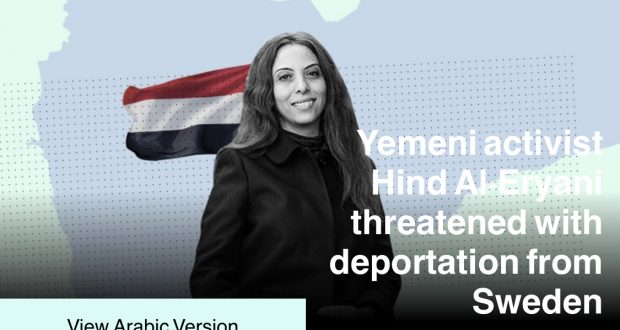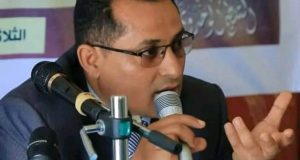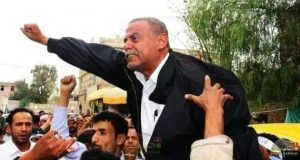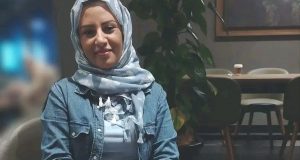By Hind Aleryani
November 15, 2018 at 12:29 PM
Washington Post
Hind Aleryani is an award-winning Yemeni journalist and women’s rights activist.
In Yemen, talking about politics and religion is dangerous. Some of my friends have been killed while others have been imprisoned; the lucky ones were granted asylum and moved abroad. We all dreamed of the Arab Spring, a romantic appellation describing the just and democratic nation we dream of. Unfortunately, the dream turned into a nightmare amidst a maelstrom of bad choices, with extremist groups — whether Sunni or Shiite — intimidating us and refusing to allow us to make ourselves heard while other states interfere to further their own interests, either to control our country or sell us their weapons.
In southern Yemen, journalists are imprisoned and murdered. Things are no better in the Houthi-controlled north. Being scared of the power of words, the Houthis imprison Baha’is for professing a different religion; they imprison, torture and kill journalists, and they ban youth art activities, which are the only way to save young people from despair and the lure of the battlefield.
I was one of the lucky ones. I was not killed, nor was I thrown in prison. I fled my country. But I am still not safe even outside of Yemen.
After my father’s death in Beirut, where he was working as a diplomat, and the start of the Yemen war in late 2014 and early 2015, it was hard for my family to return to Yemen. My mother and sister chose to go to Sweden, but I chose to go to Turkey where I could stay on a yearly renewable tourist visa. I thought I could settle there safely with my daughter and continue writing about Yemen and the ongoing war, call for peace and highlight the importance of women’s participation in the political process. My priorities were to support my country and make Yemenis’ voices heard at a time when we were totally ignored by the media.
While in Turkey, I used my work to call for women’s equal right to inheritance. I considered the dowry as an expression of women’s slavery. I stood against those claiming that beating up women was related to religion and I called for jailing a cleric and al-Islah party executive for saying in his Friday sermon at the biggest mosque in Taiz that the rape of an 8-year-old girl in the city was the result of “inappropriate” children’s clothes. I wrote that this sheikh deserves to be in prison for justifying a rapist’s deeds. I received threats at the time for this. The Houthis claimed that I was pursuing an agenda financed by international organizations to distort religion.
As a result of my work, my 16-year-old daughter and I received threats over the phone. They mentioned the name of her school and threatened to harm her if I did not shut up. My daughter was traumatized and started having panic attacks, so the only solution for us to feel safe was to move from Turkey to be with my mother and sister in Sweden last year. I applied for my daughter’s visa at the Swedish Embassy and I quickly got it three days later as I myself had a one-year Schengen visa issued by the Czech Republic.
Sweden has now denied asylum for myself and my daughter (who is receiving medical treatment for her trauma). I live in constant fear that the police will come and take us and make us go to the Czech Republic, where I will have no guarantee of asylum and where I have no family. I have refused to take any money from the state. I just want to live in safety with my daughter. The Swedish migration board said it tried to give me a call about my case. I missed the call. Instead of giving me another call or a letter to set up a follow-up meeting to discuss my case, the board immediately sent my case over to the police. “Sure we could have tried to call you a few times and maybe send a new letter for a new appointment, but we just followed standard protocol,” it told me in an email.
In 2016, during the Kuwait negotiations, I led a peaceful campaign that was met with much enthusiasm and support by many in and outside of Yemen. People expressed their support by sending us photos and videos of themselves. We even received videos from areas where there were internally displaced children, who addressed participants at the Kuwait negotiations with the message, “Do not come back unless there’s peace for Yemen.” This campaign gained the support of the United Nations envoy at the time, several European ambassadors and heads of delegations who participated in the negotiations. I had hope that peace was possible, and that hope is still there.
I was happy when I heard the news that Sweden might host Yemen peace negotiations here. At the same time, the country is deporting me and my daughter, who is suffering because of my job. What kind of message is Sweden giving to journalists and activists by doing this? We in the Arab world have already lost prominent Saudi writer Jamal Khashoggi, and his heinous murder has incited fear in every journalist. If someone like him can be killed in his country’s consulate, this means that journalism and freedom of speech are in danger. We look at Sweden as one of the safest countries for journalists, but I don’t feel safe here. I feel as if the Swedish government wants to get rid of me. But I won’t hide, because I am not a criminal. I am a journalist who bears full responsibility for anything I say. Still, if Sweden doesn’t stand with freedom of speech, then who will?
 منشور برس موقع اخباري حر
منشور برس موقع اخباري حر




